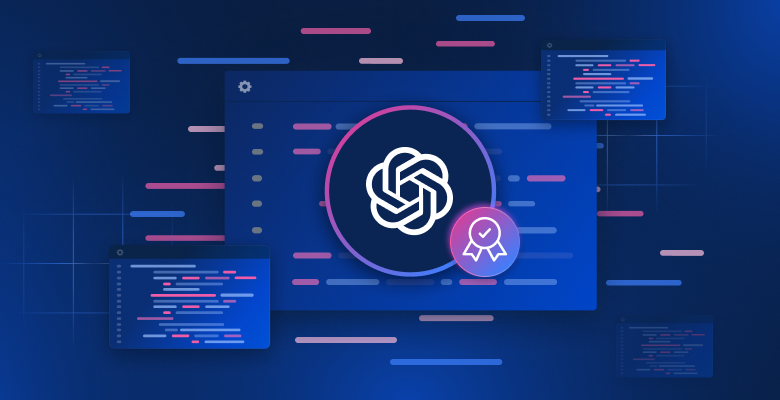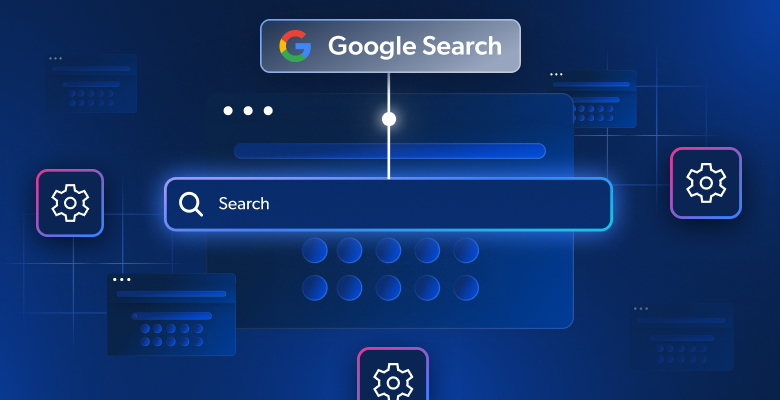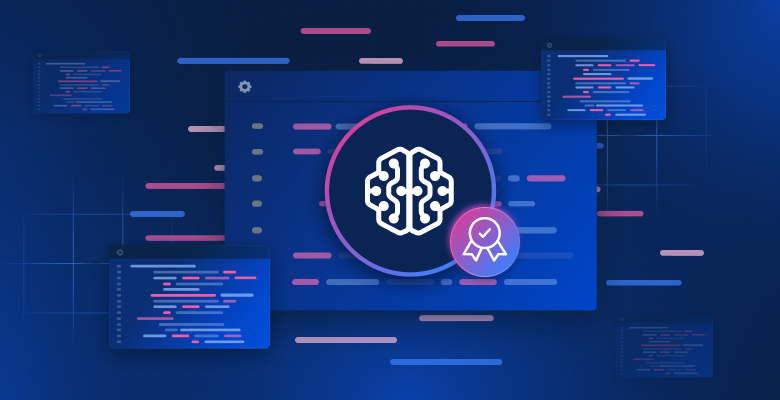In this article, you will learn:
- What SERP APIs and web search APIs are, with a focus on how they differ.
- The main aspects to consider when evaluating web search API and SERP API providers.
- The best SERP APIs and web search APIs currently available.
- A summary table to compare the selected solutions.
Let’s dive in!
SERP APIs and Web Search APIs: What They Are and How They Differ
Understand the concepts of SERP APIs and web search APIs, where they differ, and what they have in common.
SERP API: Definition and Usage
A SERP API automates the extraction of data from search engine results pages (known as SERPs). In simple terms, it:
- Connects to a supported search engine.
- Sends your search query (based on parameters like language, location, and device).
- Returns either the raw SERP HTML or parsed data from the SERP in structured formats such as JSON.
When the API returns parsed data, it typically consists of all relevant SERP elements. These include organic results, ads, featured snippets, and more.
In essence, a SERP API provider enables simplified and scalable access to search data across one or more search engines. SERP APIs are commonly used for SEO analysis, market research, competitive intelligence, website performance monitoring, and many other applications.
Web Search API: Definition and Usage
A web search API is a tool that makes it easier to search for data on the internet. Behind the scenes, it can aggregate results from multiple search engines or even rely on proprietary techniques beyond traditional SERP scraping.
Unlike typical SERP APIs, web search APIs offer broader search capabilities. Also, they are often integrated with LLMs through tool calling or via middleware approaches (e.g., MCP servers). The idea is to enable an LLM to perform real-time web searches. That way, it can access fresh, up-to-date web information to produce more accurate and relevant results.
Thus, web search APIs are commonly used to deliver richer information in applications like RAG chatbots, virtual assistants, AI agents, and research tools.
SERP API vs Web Search API
| SERP APIs | Web Search APIs | |
|---|---|---|
| Focus | Retrieving raw or structured data from SERPs | Providing general web search functionality |
| Generally based on | Web scraping | AI or custom algorithms |
| Flexibility | Medium/Low (can only target one or more specific search engines) | High (no limitations by one search engine or another) |
| Typical Data Output | Raw HTML and/or JSON | JSON |
| Use Cases | SEO monitoring, competitive analysis, keyword research, tracking search engine visibility | Adding search capabilities to websites or apps, enabling user-specific information retrieval in LLMs |
Note: SERP APIs with LLM integration can power web search API functionality and, in some cases, be considered web search APIs themselves.
Now, SERP APIs and web search APIs serve slightly different purposes. Still, their functionalities overlap remarkably. That is why some modern providers combine both approaches.
In other words, evaluating SERP APIs and web search APIs separately does not make much sense. The reason is that you will likely need both in your workflows. That is why it often makes more sense to choose a provider that can serve as both a SERP API and a web search API.
How To Evaluate the Best SERP API and Web Search API Services
There are dozens of online providers offering SERP APIs and/or web search APIs. As you can imagine, navigating this landscape is not easy.
That becomes much more manageable with a clear list of comparison criteria, like the ones below:
- Type: A brief description of what the provider is and the industry it operates in. This also helps you understand what other types of solutions the provider might offer.
- Nature: Whether the solutions offered are open-source or commercial.
- Supported scenarios: Whether the provider supports both SERP API and web search API use cases.
- LLM integration: Whether the solution can be integrated with large language models and how easily.
- Supported search engines: The list of search engines from which the service can retrieve data.
- Scalability: The number of requests you can make within a given time frame.
- Free option: Whether a free plan or trial is available before committing to a paid plan.
- Pricing: The pricing model used by the provider.
Top 12 SERP APIs and Web Search APIs
Time to apply the criteria presented earlier to list and rank the best SERP API and web search API services currently available on the market.
1. Bright Data
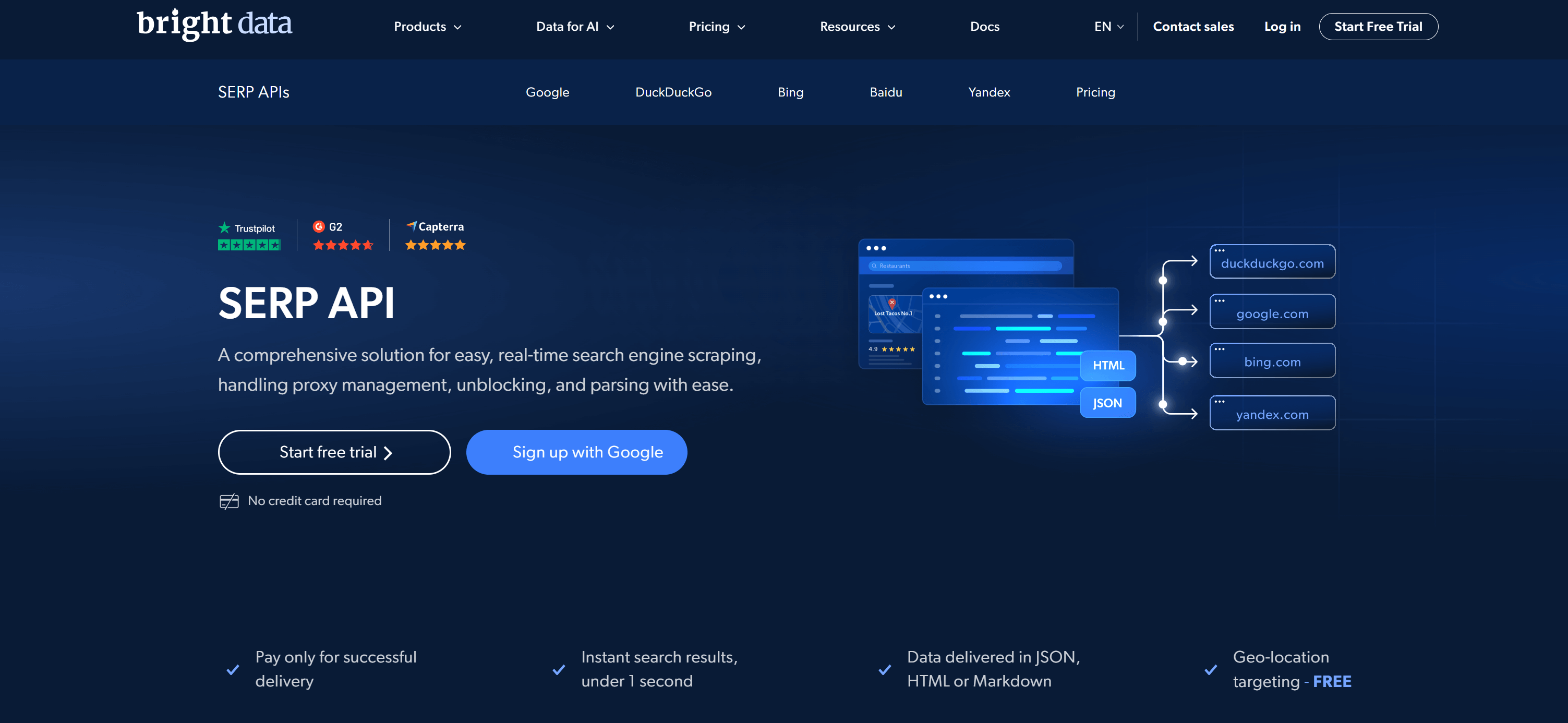
Bright Data is a leading web scraping solution that equips you with a large set of tools for web data retrieval. These are all accessible for AI integration via its MCP server and numerous official integrations.
When it comes to searching the web, Bright Data’s flagship solution is the SERP API. This API enables scalable scraping of real-time results from major search engines, with dedicated scrapers like:
- Google Search API
- Bing Search API
- Yahoo Search API
- DuckDuckGo Search API
- Yandex Search API
- Naver Search API
- Baidu Search API
- And more…
SERP API returns data in structured JSON, raw HTML, or AI-ready Markdown formats. It supports various search types like maps, news, and shopping, with precise geo-targeting and optimized high-volume traffic handling. It achieves an average response time of under one second.
SERP API can also operate as a web search API tool. To see examples of SERP API integrations as a web search API, refer to the following guides:
- LlamaIndex & Bright Data to Search the Web
- Dify & Bright Data to Search the Web: Build a Scraping AI Agent
- Make CrewAI Agents Smarter: Integrate SERP API for Live Data
- Build AI Agents With SERP & Web Scraping in Agno
The SERP API can also be embedded directly into web applications to provide web search functionalities, as demonstrated in our SEO rank tracker building tutorial.
Bright Data operates on a pay-per-success model, with flexible pay-as-you-go plans. Services cater to both developers and businesses. Specifically, in the AI data infrastructure hub, you will find solutions delivering high data quality, global coverage, enterprise-grade performance, plus excellent support, customization, and scalability.
This is what makes Bright Data the best SERP API and web search API provider. Take a look at the docs to get started.
Type: AI and BI data infrastructure provider
Nature: Commercial, with support from several open-source integrations and libraries
Supported scenarios: SERP API use cases supported via direct API calls and integrations in LLMs, no-code platforms, and AI workflow or agent-building tools to enable web search API functionality
LLM integration: Yes, via a lot of official integrations as well as a dedicated MCP server
Supported search engines: Google, DuckDuckGo, Yandex, Baidu, Yahoo, Naver, and more
Scalability: Unlimited
Free option: Yes, via a free trial
Pricing: Yes, starting at $0.0015/result
2. Tavily
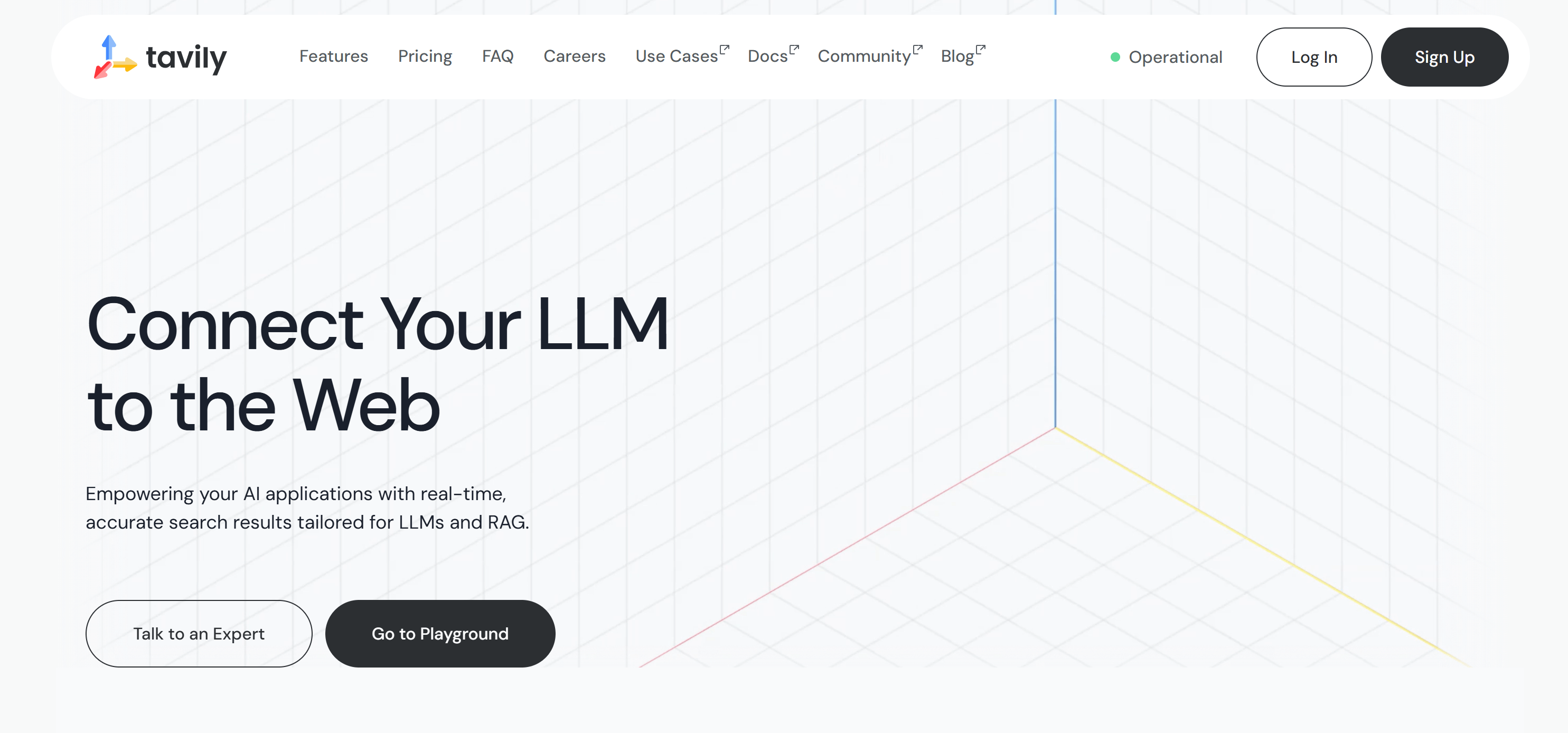
Tavily is an API provider that connects LLMs with real-time web search capabilities. It supports web search scenarios through direct API calls or AI integrations via its MCP server, as well as other tools.
Tavily uses a proprietary search algorithm with undisclosed search engines. It offers scalable usage with 100 requests per minute in development and up to 1,000 in production. A free plan provides 1,000 API credits per month, with flexible pay-as-you-go and subscription pricing.
Type: Provider of APIs to connect LLMs with the web
Nature: Commercial, but supported by an open-source SDK and MCP server
Supported scenarios: Web search scenarios supported via direct API calls or LLM integrations
LLM integration: Yes, via an MCP server and other integrations
Supported search engines: Undisclosed, custom search algorithm
Scalability: 100 request per second on development environments and 1,000 in production
Free option: Yes, via a free plan for 1,000 API credits/mo
Pricing:
- Pay As You Go: $0.008/credit
- Project: $30/mo
- Enterprise: Custom
3. Exa

Exa is a commercial search engine API provider built for AI and RAG workflows. Unlike traditional SERP APIs, Exa uses custom embeddings-based models trained to understand semantic meaning.
That makes it more of a web search API rather than a regular SERP API, as it does not return actual SERPs but rather aggregated search data. Keep in mind that it also offers official SDKs and integrations with major AI platforms.
Type: Search engine API and web data dataset provider
Nature: Commercial solution backed by open-source SDKs
Supported scenarios: Web search API scenarios via LLM integrations
LLM integration: Yes, via LLM tool calling and official libraries for RAG workflows and agentic RAG, and MCP integrations
Supported search engines: Custom AI-based approach to query searching
Scalability: 5 requests per second
Free option: Yes, with $10 in free credits for new customers
Pricing: Pay-as-you-go plan with multiple options based on the number of results you need
4. SerpApi
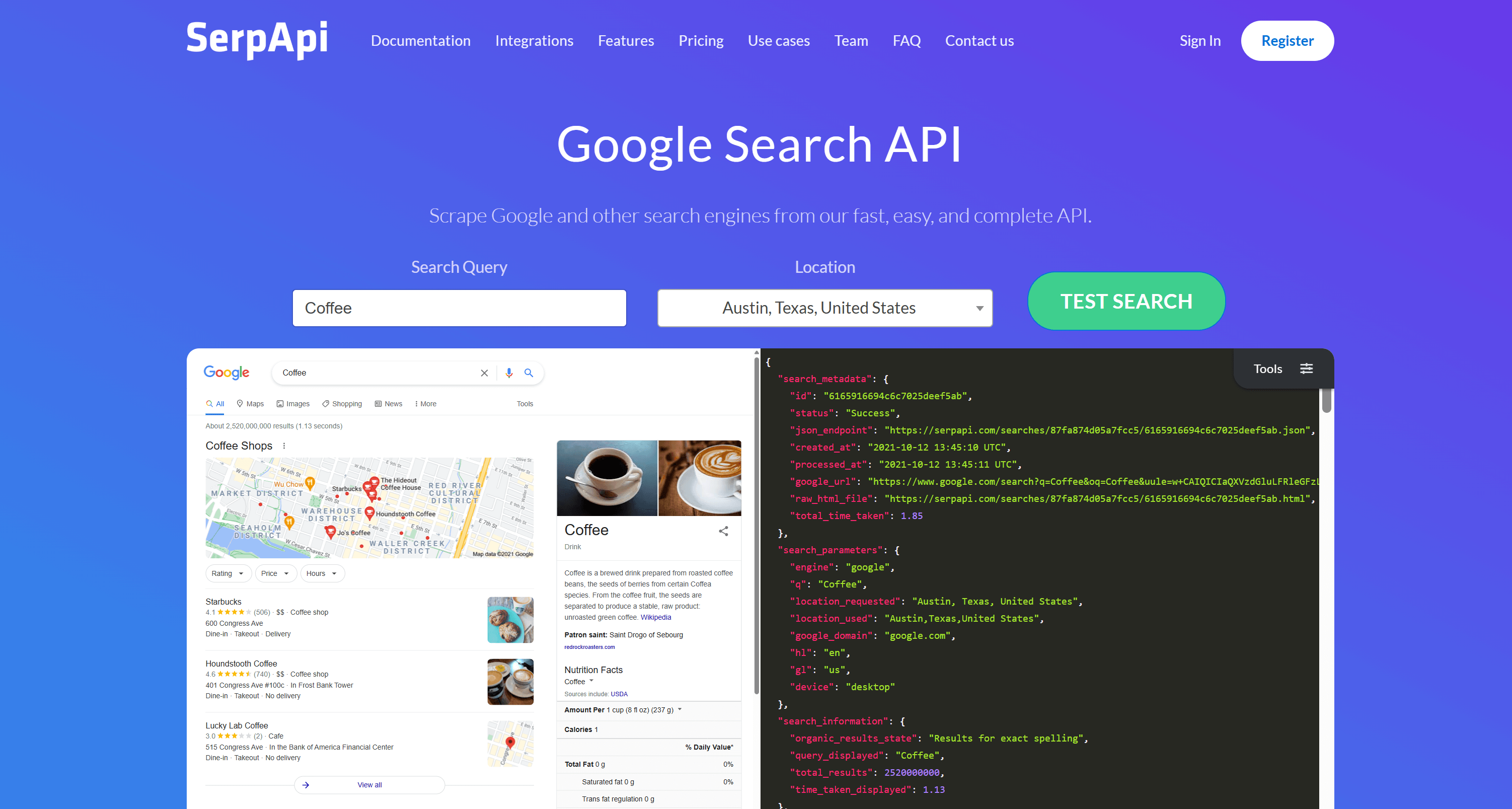
SerpApi operates as a provider of multiple SERP APIs. Each API covers a particular search feature of the supported search engines. These endpoints can also function as web search APIs through LLM integrations in scripts and no-code platforms. SerpApi offers official SDKs, a LangChain library, and a free tier with 100 monthly searches.
Type: Service that provides access to search engine results data via API
Nature: Commercial, with open-source SDKs and libraries
Supported scenarios: Primarily focused on SERP API use cases, with support for web search API integrations via LLM integrations in scripts and no-code platforms
LLM integration: Yes, via both official integrations in no-code platforms (e.g., Make, n8n, and others) and a LangChain library
Supported search engines: Google, DuckDuckGo, Naver, Baidu, Yandex
Scalability: Hourly throughput is 20% of your monthly plan volume for plans under 1M searches. For plans with 1M+ searches, it’s 100,000 + 1% of the plan volume per hour
Free option: Yes, via 100 free searches a month
Pricing:
- Developer: $75/mo for 5,000 searches
- Production: $150/mo for 15,000 searches
- Big Data: $275/mo for 30,000 searches
5. DDGS

DDGS, short for Dux Distributed Global Search, is a Python open-source library. It was originally known as duckduckgo_search, which focused solely on DuckDuckGo SERP scraping. Recently, it has been extended to support multiple search engines. DDGS is not a direct API provider itself. Instead, it serves as a powerful engine for implementing your own custom search APIs.
Type: Python library
Nature: Open-source
Supported scenarios: Code-oriented SERP API integrations, with the flexibility to build web search API functionality using custom logic
LLM integration: Yes, via an unofficial LangChain tool for DuckDuckGo
Supported search engines: Brave, DuckDuckGo, Google, Mojeek, Yandex, Yahoo
Scalability: Some servers may be temporarily unavailable due to rate-limiting issues, IP bans, or geo-restrictions in certain countries
Free option: Yes, free forever
Pricing: Free
6. Serper

Serper is a premium SERP API provider developed around Google Search scraping. It achieves fast, structured access to Google Search results. As a SERP API solution, it is primarily designed for developers.
While it is built around SERP-related use cases, Serper can also serve as a Web search API when integrated into LLMs (e.g., via its unofficial LangChain plugin). That makes it a possible option for powering search in AI agents, automation tools, and other data-driven applications.
Type: Provider of a Google Search API
Nature: Commercial
Supported scenarios: SERP API use cases, with unofficial integrations that enable use as a web search API within LLMs
LLM integration: Yes, via an unofficial LangChain plugin
Supported search engines: Google
Scalability: Up to 300 queries per second
Free option: Yes, with 2,500 free queries
Pricing:
- Starter: $50 for 50k credits
- Standard: $375 for 500k credits
- Scale: $1,250 for 2.5M credits
- Ultimate: $3,750 for 12.5M credits
7. Apify

Apify is a full-stack web scraping and automation platform. It offers a wide range of prebuilt serverless data extraction scripts called “Actors,” and users can easily deploy their own. Each Actor can be accessed via API and also via an MCP server. Apify provides several dedicated Actors for scraping SERPs, so it serves as both a SERP API and a web search API solution.
Type: Full-stack web scraping and data extraction platform
Nature: Commercial, but backed by a few open-source libraries
Supported scenarios: Both direct SERP APIs and web search APIs for use in LLMs, AI agents, and more
LLM integration: Yes, each actor is available via an MCP server, with other official integrations with solutions like CrewAI, Agno, and many others
Supported search engines: Many
Scalability: No more than 250,000 requests per minute
Free option: Yes, via a free plan
Pricing: Depends on the chosen Actor
8. Firecrawl

Firecrawl is a flexible web crawling and scraping API provider. In detail, it is one of the best AI scraping tools of the year. One its its newest features is Search API, a web search API that leverages Serper behind the scenes.
Firecrawl offers simplified LLM integration through an official MCP server and supports AI agents and automation tools. Its pricing is credit-based, with a free-forever plan and paid tiers that scale up to 2,500 calls per minute. For similar use cases, explore the best Firecrawl alternatives.
Type: API provider for crawling and scraping websites
Nature: Commercial, with free and open-source options available
Supported scenarios: Web search API thanks to the Search API feature
LLM integration: Yes, through an official MCP server and integration with popular AI agents and workflow automation tools
Supported search engines: Undisclosed, but it relies on Serper under the hood
Scalability: From 5 to 2,500 calls per minute (based on your plan)
Free option: Yes, via a free-forever plan with 500 credits
Pricing:
- Hobby: $19/mo for 3,000 credits per month
- Standard: $99/mo for 500,000 credits per month
- Growth: $399/mo for 500,000 credits per month
9. DataForSEO

DataForSEO provides SERP APIs to get data for major search engines. While it primarily focuses on SERP data integration, it also supports web search API scenarios through LLM integrations. Scalability is limited to 2,000 API calls per minute, but there is an unlimited free trial and a few pay-as-you-go plans for flexible pricing.
Type: Solution that provides APIs for SEO and SEM analytics
Nature: Commercial, with some open source clients, SDKs, and libraries
Supported scenarios: Primarily promotes SERP API use cases, but also supports web search API scenarios within LLMs
LLM integration: Yes, via an official MCP server and an unofficial LangChain tool
Supported search engines: Google, Yahoo, Naver, Baidu, Seznam
Scalability: Up to 2,000 API calls per minute
Free option: Yes, through an unlimited free trial
Pricing:
- Standard Queue: Starting at $0.0006 per SERP page with a turnaround time of 5 minutes
- Priority Queue: Starting at $0.0012 per SERP page with a turnaround time of 1 minute
- Live Mode: Starting at $0.002 per SERP with a turnaround of up to 6 seconds
10. SearchApi

SearchApi offers real-time SERP API services focused mainly on traditional search engine results. Supported engines are Google, Bing, Yahoo, and others. It also extends functionality to web search API use cases through LLM integrations available in no-code platforms like n8n and Dify, plus an unofficial LangChain tool. SearchApi can be used for SEO, market research, and AI-driven search workflows.
Type: Provider of real-time SERP APIs
Nature: Commercial
Supported scenarios: Mainly SERP API use cases, with additional support for web search API via LLM integration in no-code integrators
LLM integration: Yes, via official integrations in platforms like n8n and Dify, and an unofficial LangChain tool
Supported search engines: Google, Bing, Baidu, DuckDuckGo, Yahoo, Naver
Scalability: Up to 20% of your plan’s credits each hour
Free option: Yes, via 100 free requests
Pricing:
- Developer Plan: $40/mo ($4 for 1,000 searches, up to 10,000 searches)
- Production Plan: $100/month ($3 per 1,000 searches, up to 35,000 searches)
- BigData Plan: $250/mo ($2.5 per 1,000 searches, up to 100,000 searches)
- Scale Plan: $500/mo ($2 per 1,000 searches, up to 250,000 searches)
11. ZenSerp

Zenserp is a pure SERP API that enables users to collect real-time search engine results from different search engines. It supports automated SERP data collection for tracking keyword rankings, SEO insights, and competitive analysis.
The API allows customization of search queries based on location, language, and other parameters. Note that significant web search API integrations are currently unavailable.
Type: SERP API provider
Nature: Commercial APIs
Supported scenarios: SERP API use cases, including keyword search volume, keyword CPC, and more
LLM integration: Not directly
Supported search engines: Google, Bing, Yandex
Scalability: No more than 400 concurrent connections
Free option: Yes, via a free plan with 50 searches
Pricing:
- Small: $49.99/mo for 5,000 searches
- Medium: $129.99/mo for 20,000 searches
- Large: $249.99/mo for 50,000 searches
- Very Large: $499.99/mo for 120,000 searches
12. Brave Search API
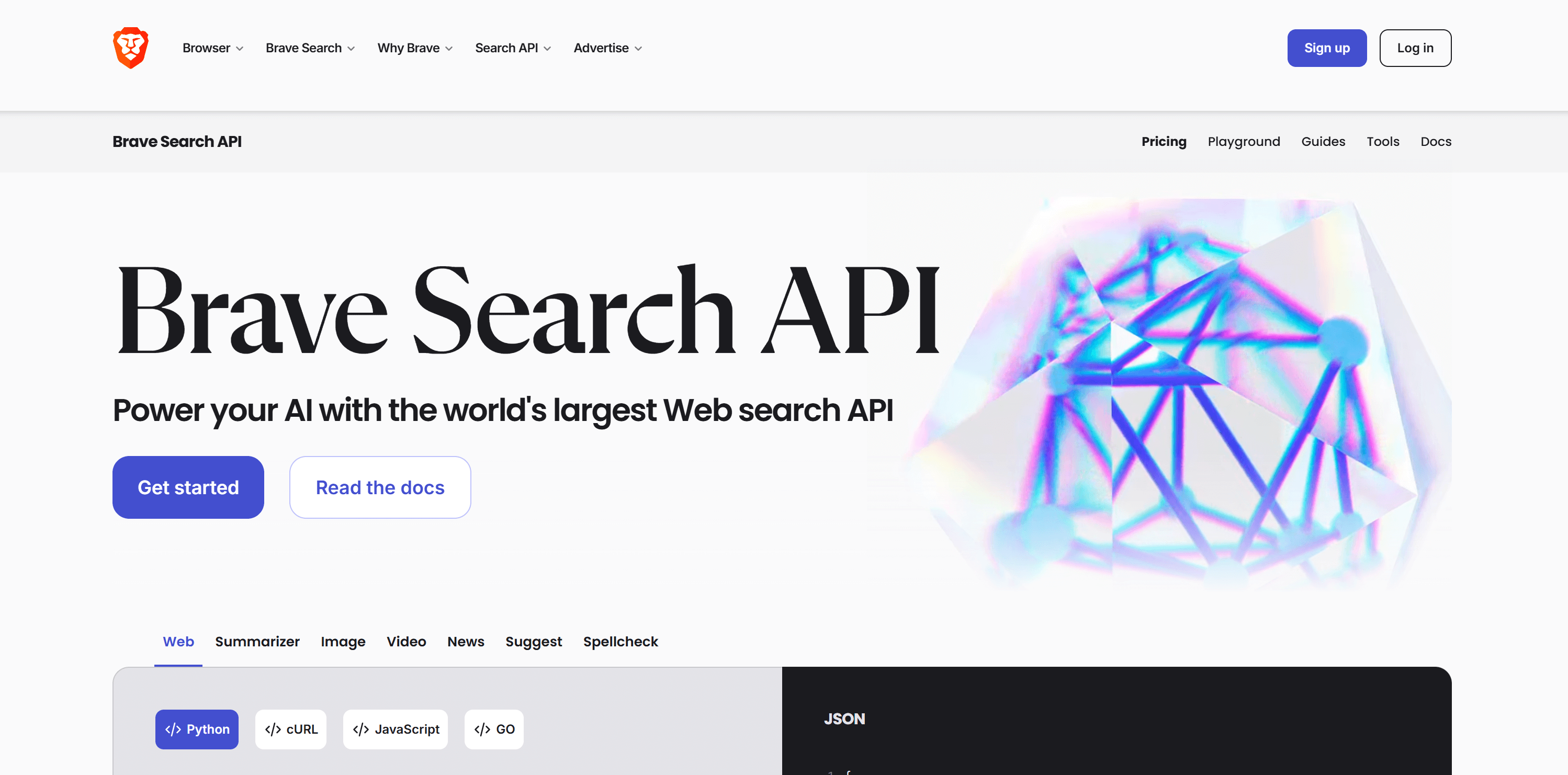
Brave offers programmatic access to its data through the Brave Search API. This API delivers web, image, video, and news search results extracted from the Brave search engine, which has an independent index of over 30 billion pages.
With premium plans, you also gain the right to use Brave’s data in LLMs. However, this requires custom integrations or relying on unofficial plugins. The reason is that there is currently no easy, official way to use the Brave Search API as a web search API within LLMs.
Type: Search engine and open-source browser developing company
Nature: Official SERP API provider
Supported scenarios: SERP API integrations with data retrieved from the Brave search engine
LLM integration: Yes, but only via an unofficial LangChain tool (as the official @modelcontextprotocol/server-brave-search package has been recently deprecated)
Supported search engines: Brave
Scalability: Up to 50 queries per second
Free option: Yes, via a free plan with 1 query per second and up to 5,000 queries/mo
Pricing:
- Base AI: $5.00 for per 1,000 requests (20M queries/mo)
- Pro AI: $9.00 per 1,000 requests (unlimited queries/mo)
Best SERP APIs and Web Search APIs: Summary Table
For a quick comparison of SERP API and web search API services, take a look at the following table:
| Solution | Type | Search Engines | SERP API | Web Search API | LLM Integration | Official MCP Support | No-Code Integration | Free Option | Pay-as-you-go | Scalability | Entry Price |
|---|---|---|---|---|---|---|---|---|---|---|---|
| Bright Data | AI and BI data infrastructure provider | Google, DuckDuckGo, Yandex, Baidu, Yahoo, Naver, and more | ✅ | ✅ | ✅ | ✅ | ✅ | ✅ | ✅ | Unlimited | $0.0015/result |
| Tavily | Web search API with AI-first focus | — (Undisclosed) | ❌ | ✅ | ✅ | ✅ | ✅ | ✅ | ✅ | Up to 1,000 requests/day | $0.008/credit |
| Exa | AI-native search engine API | Custom AI-based search approach | ❌ | ✅ | ✅ | ✅ | ✅ | ✅ | ✅ | 5 requests/second | Many pay-as-you-go options |
| SerpApi | Dedicated SERP API provider | Google, DuckDuckGo, Naver, Baidu, Yandex | ✅ | ✅ | ✅ | ❌ | ✅ | ✅ | ❌ | ~20% of your plan’s credits per hour | $75/mo |
| DDGS | Python library | Brave, DuckDuckGo, Google, Mojeek, Yandex, Yahoo | ✅ | Requires custom logic | Requires custom logic | ❌ | ❌ | ✅ | — (free solution) | Varies | Free |
| Serper | Lightweight Google Search API | ✅ | ✅ | ✅ | ❌ | ❌ | ✅ | ❌ | Up to 2,500 queries/day | $50 | |
| Apify | Web scraping/data extraction platform | Many (varies by Actor) | ✅ | ✅ | ✅ | ✅ | ✅ | ✅ | ✅ | Up to 250,000 request per second | Varies by Actor |
| Firecrawl Search | Crawler and indexer API | — (Undiscolsed, but relies on Serper) | ❌ | ✅ | ✅ | ✅ | ✅ | ✅ | ❌ | From 5 to 2,500 calls per minute | $19/mo |
| DataForSEO | SEO & SEM API provider | Google, Yahoo, Naver, Baidu, Seznam | ✅ | ✅ | ✅ | ✅ | ❌ | ✅ | ✅ | Up to 2,000 request per second | $0.0006/SERP page |
| SearchApi | Aggregator of search engine APIs | Google, Bing, Baidu, DuckDuckGo, Yahoo, Naver | ✅ | ✅ | Basic support | ❌ | ❌ | ✅ | ❌ | 20% of your plan’s credits per hour | $40/mo |
| Zenserp | SERP API provider | Google, Bing, Yandex | ✅ | ❌ | Not natively | ❌ | ❌ | ✅ | ❌ | 400 concurrent connections | From $49/month |
| Brave Search API | Search engine & browser developer | Brave | ✅ | Partially | Limited | ❌ | ❌ | ✅ | ❌ | Up to 50 query per second | $5 per 1,000 requests |
Honorable mentions:
- Bing Search API: Formerly an official Microsoft API for directly retrieving search data from Bing. It was deprecated as of August 11, 2026. Explore the top Bing Search API alternatives.
Conclusion
In this article, you learned the key differences between SERP APIs and web search APIs, along with the use cases they support. With so many options available, comparing and testing them all can be costly and time-consuming. Here, we tested the top providers for you.
Bright Data emerged as the leading provider for both SERP API and web search API scenarios. This is thanks to the powerful SERP API, which can be easily integrated directly via API or through LLMs and other applications. That makes it a powerful web search API solution as well.
Sign up for a free Bright Data account today and start exploring our data retrieval solutions!



